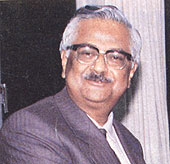 |
| UNSWAYED BY FAME: Raja Ramanna was a modest man |
I?d once thought that if I ever became famous and wrote an autobiography, I would call it The King and I. The ?king?, of course, would be Raja Ramanna.
When I first met Raja Ramanna, the hero was out of action. The architect of India?s first nuclear bomb, which exploded amid the sand dunes of Pokhran in 1974, had retired from his job. But he?d hardly retired from the real action of life. This was the period when the human being in him shone through. These were the years that I was there with him, my mentor-cum godfather.
When I was about 18, I had written down some of my ideas on universal symmetry, cosmology and the grand unification of science and the arts. Someone who came across my manuscript advised me to send it to an eminent scientist in Bangalore, Dr Raja Ramanna. It was a co-incidence that almost at the same time I was offered a merit seat to study medicine at Bangalore Medical College. And at that time I was also asked by a English daily from Calcutta to write about the scientist, in relation to the Atom Bomb project.
It is therefore, as a freelance science journalist, a medical student and a speculative researcher that I met Dr Ramanna at his home in R.N. Tagore Nagore, Bangalore. Before I met him I had managed to read his biography and came to know of his legendary skills at the piano.
My first impression of my to-be godfather was that of a matured man who had seen a lot of life, but would wear an impression of witty playfulness. But when he played the piano on my request, the soul of the human being began to emerge. He appeared to me a man seeking the unification of all things universal. I wondered how those fingers that engineered an atomic gadget could play Beethoven so elegantly. After the memorable session with the piano he took me to Bangalore Club for lunch. ?I don?t like ill-fed students,? he quipped.
Ramanna spent his childhood in Mysore and graduated from Tambaram. He researched on nuclear physics in England, worked mostly at the Bhabha Atomic Research Centre in the then Bombay, and settled in Bangalore. But he adored Calcutta. He admired the cultural and intelligent charm of Bengalis and would reminisce on his trips to the city in the 1930s when Bengal was at the height of its glory. He would stay in a special suite of a city hotel, but for socialising Bengal Club was the place of his choosing. He always found time to spend with me, musing over how I treasured the books, cards, photographs and mementoes he had gifted me over the years.
A Western author had called Ramanna a ?nuclear hawk?. It is true that he disliked hypocritical talk of disarmament by Western nations who already possessed hordes of nuclear weapons. He?d occasionally look at the proceedings in our own Parliament with sarcastic amusement. Two Cheers to Democracy? by E. M. Forster is a book he once meaningfully presented to me.
Till his death he researched on everything from science and nuclear fission to comparisons of the ragas with notations in Western classical music. His greatest passion in life was not an atom bomb as many may think but the great Hungarian composer Franz Liszt, whom he felt to have ?elevating and transcendental qualities in his music?.
In 1998 the Bangalore Medical College students? association decided to honour me for some of my extra-curricular activities at a function. Dr Ramanna was the guest-in-chief. All the elite of Bangalore was present. I felt as proud then as I did when I met the dignitaries who visited him so frequently in his Delhi house as regular visitors. And yet, he himself remained unaffected by both his own stature and theirs. At times he would tell people with great pride that I was a busy doctor in Calcutta.
The crowning glory for me came with Pokhran-2 in 1998, the day of India?s last atomic test. He was then in Bangalore. He called me over to his place and I saw that he looked pensive. ?I am growing old,? he said, ?you handle the phone calls today?. And then the calls poured in. ?The scientists have made India proud? was the statement I made on his behalf to the callers, many of them big names in the media. It was probably the most glorious moment of my life.
I once asked Dr Raja Ramanna, among the many roles he?d played, which he had enjoyed the most. ?Being a citizen of this world,? is what he said in reply.










